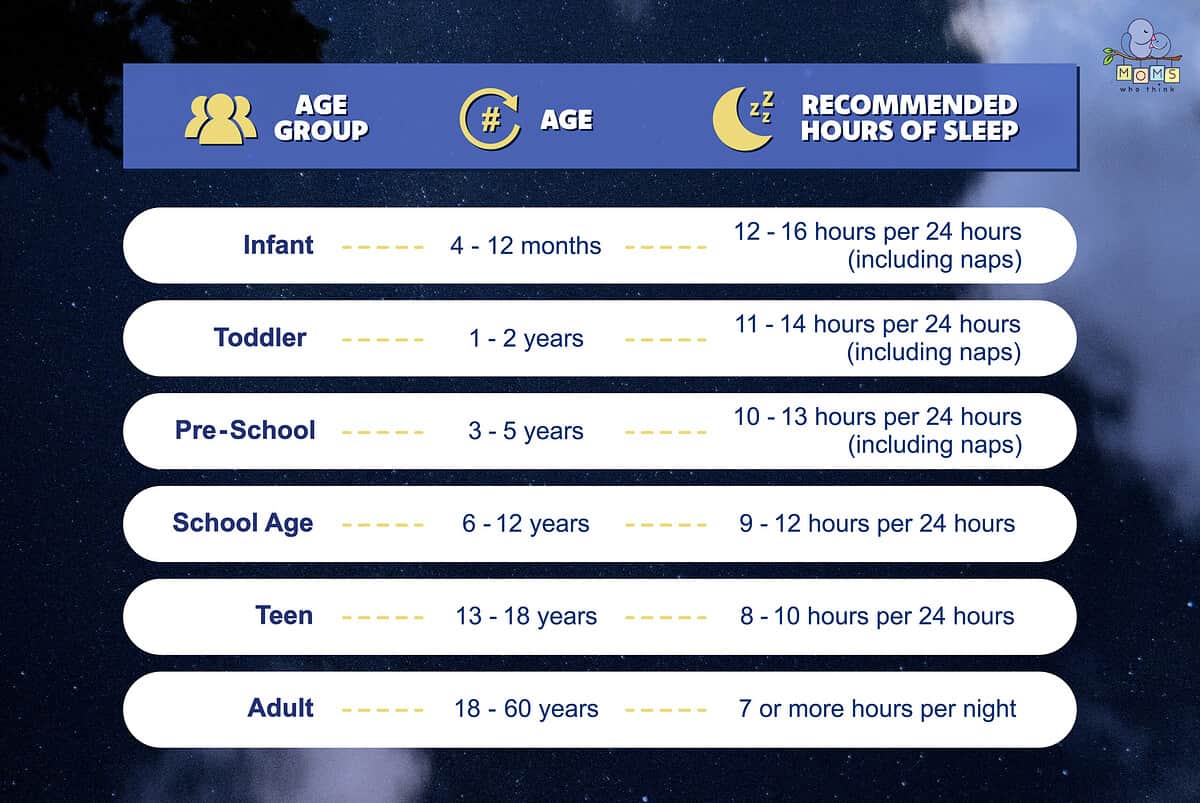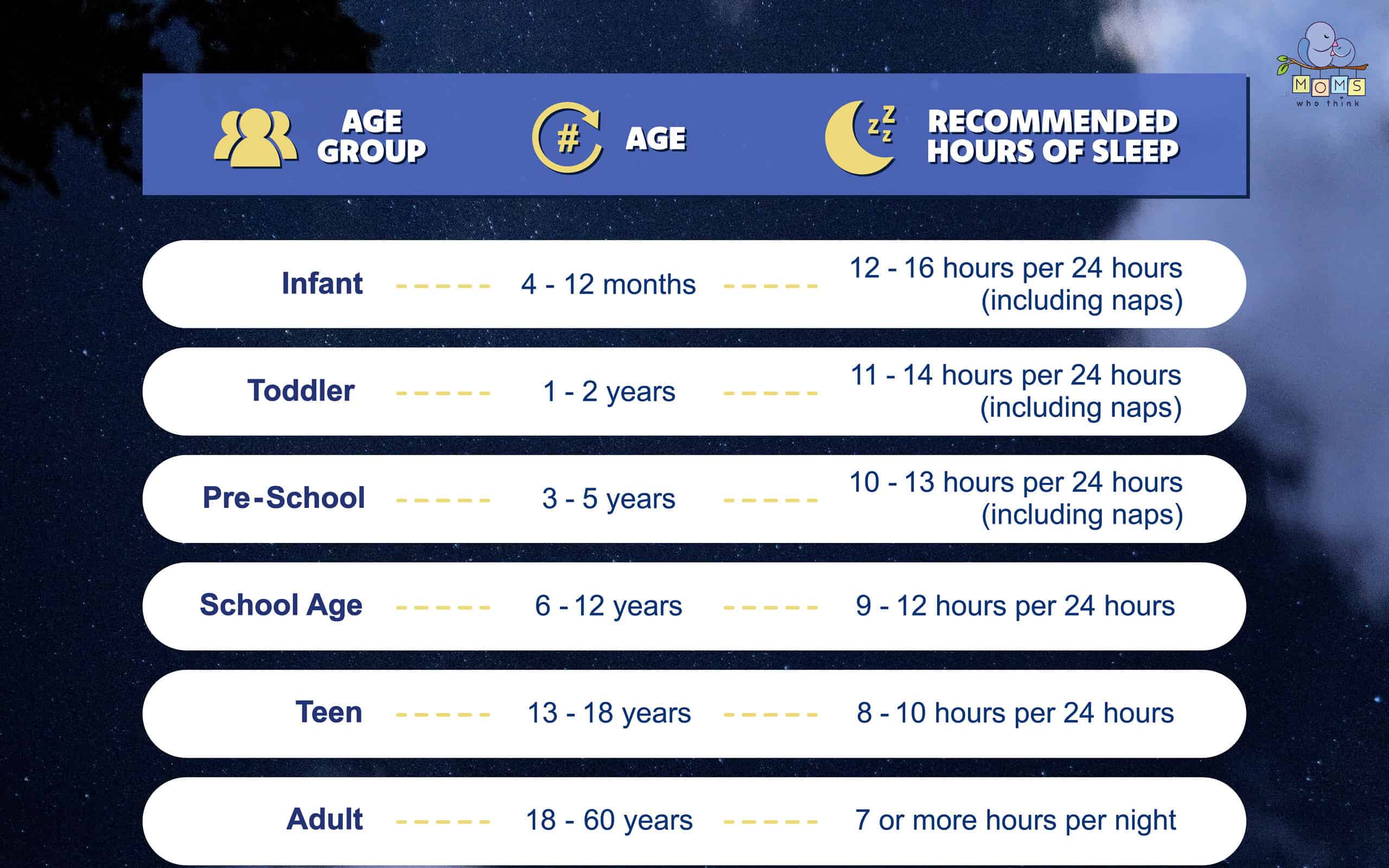Do you wake up feeling tired and worn out? People of all ages face difficulty getting the correct amount of sleep, affecting their physical and mental well-being. The amount of rest required varies depending on your age. In this post, we will provide a chart that shows the recommended hours of sleep needed for each age group. We will begin with infants and end with adults ages 18-60. This post will also provide some effective sleep strategies for those struggling.
Infants
Did you know that infants between the ages of 4 and 12 months require the most sleep compared to any age group? They need 12 to 16 hours of sleep, including naps. These tiny beings require rest to support their rapid growth and development. Sleep also plays a role in strengthening their immune system and cognitive abilities. Don't be surprised if your little one dozes off during playtime or mealtime; it's simply their body's way of rebooting. So go ahead and let them enjoy their snooze. It will benefit them and you tremendously!
Toddlers
Next, let's talk about toddlers. They need 11 to 14 hours of sleep every day. Taking naps is crucial for toddlers who are 1 to 2 years old. However, we all know that getting them to nap can sometimes be a struggle. This can be resolved by establishing an effective bedtime routine that suits you and your toddler. Ensuring they get the right amount of sleep helps them wake up energized and ready the next day.

©javi_indy/Shutterstock.com
Preschoolers
Now, let's move on to preschoolers. Children ages 3 to 5 years require 10 to 13 hours of sleep, including naps, to stay healthy and active. Even though your little ones may resist winding down, a good night's rest can work wonders for their well-being. A refreshing nap or a peaceful slumber can recharge their minds and bodies, keeping them alert and refreshed throughout the day. To help them achieve this, establish a sleep schedule and create a comfortable bedroom environment. Then, be prepared to witness the effects of quality rest on your child's overall health and well-being.
School Age
Children in school need between 9 and 12 hours of sleep every night. For this age group, getting rest is just as crucial as studying! While getting them to bed on time may be difficult, adequate rest is essential for their growth and development. Getting sufficient sleep enhances their ability to focus and remember things. It also helps regulate their mood. So, if you want your child to excel in school and have a good day, ensure they get the recommended amount of rest!
Teenagers
Teenagers ages 13 and 18 years require 8-10 hours of sleep per night. They might try to convince you that letting them stay up late is cool, but it is quite the opposite. Sufficient rest is vital for their mental health. It also enhances their academic performance and athletic capabilities. Ensure they get enough rest by having them go to bed at their scheduled bedtime.

©BearFotos/Shutterstock.com
Sleep Strategies for Children
Creating a bedtime routine can be challenging, but it is needed to help your child get sufficient rest. Adequate rest is crucial to your child's physical and cognitive development. Here are some valuable tips to help your little one have a good night's sleep.
- Stick to a consistent bedtime- It's essential to have a bedtime routine that helps your child unwind and prepare for bed. This means getting them tucked in within a 30-minute window each night.
- Create a calm environment- Children also sleep better in soothing surroundings. Keep your child's bedroom dark and quiet to promote rest. Dim lights, such as night lights, can be used if needed. You can also use white noise or play lullabies to mask any noises.
- Set limits on screen time- Watching TV, playing video games, or using smartphones or tablets before bed can make it difficult for your child to fall asleep quickly and stay asleep throughout the night. Experts recommend ending screen time usage one hour before bedtime.
- Establish a relaxing bedtime routine- Creating relaxation before bedtime can help signal your child's body that it's time for bed. This can include bathing, reading a book, or meditating before tucking them in.
Remember, developing healthy sleep habits early in life is critical. Help your child have a restful night by establishing consistent bedtime rituals. Also, pay attention to your child's sleep patterns. Watch out for any signs of sleep deprivation or sleep disorders. Common symptoms include being overly active, irritable, difficulty concentrating, and tired during the day. If you have any concerns, talk to your pediatrician.

©
Adults
Getting enough rest is crucial regardless of your age. Adults between 18 and 60 need 7 hours of sleep every night. Insufficient rest can affect your mood, ability to concentrate, and health. So, if you want to be engaged in meetings, perform well during workouts, or feel like a superstar overall, prioritize getting quality rest each night. Your body and your brain will appreciate it!
Sleep Strategies for Adults
We all understand the frustration of struggling to get a good night's rest. Below are some suggestions to help you achieve that.
- Stick to a schedule- Establishing a set time to wake up and go to bed each day, even on weekends, is essential! This will help adjust your body's internal clock, increasing sleep quality.
- Create an environment that promotes rest- Ensure your bedroom is dark, quiet, and set to a cool temperature. Investing in quality pillows and sheets can also make a difference. Lastly, try avoiding technology before bedtime, as the blue light emitted by screens can interfere with your ability to fall asleep.
- Limit caffeine and alcohol intake- It is recommended to avoid consuming caffeine or alcohol later in the evening as they can upset your sleep cycle, making it difficult for you to both fall asleep and stay asleep.
- Incorporate exercise into your daily routine- Physical activity can improve sleep quality. However, try finishing your workout at least 90 minutes before bedtime so your body temperature and endorphins can return to favorable sleep levels.
- Prioritize relaxation before bed- Incorporating calmness into your evening routine is a great way to wind down. Consider calm activities such as reading a book, yoga or meditation, or taking a warm bath.
These tips can assist in relaxing your mind and preparing your body for a good night's sleep. By following these suggestions, you'll be well on your way to waking up feeling rejuvenated.

©iStock.com/Prostock-Studio
In summary, getting good sleep is essential for your health and well-being. Everyone needs sufficient rest to be their best self regardless of age. If you or a loved one are struggling with sleep, there are several techniques you can try. These include establishing a calming bedtime routine, avoiding devices before bed, and ensuring your bedroom is a pleasant sleep environment. Feel free to explore the tips and tricks above if you have trouble resting. Sweet dreams!
Up Next:
- How To Get Baby To Sleep In Bassinet in 7 Steps
- When Should Your Toddler Sleep in a Bed?
- When Do Babies Sleep Through the Night?
- Foods to Help You Sleep
- My Teen Sleeps All Day
